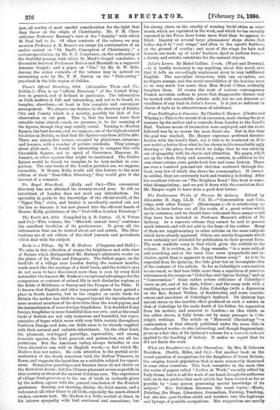The Posthumous Works of Thomas De Quincey. Edited by Alexander
H. Japp, LL.D. Vol. II.—" Conversation and Cole- ridge, with other Essays." (Heinemann.)—It is satisfactory, no doubt, to have before one all the works of a great writer which are in existence, and we should have welcomed these essays could they have been included in Professor Masson's edition of De Quincey. As a separate volume they cannot be said to possess much interest, and will not add to the fame of the author. Many of them are supplementary to other articles on the same subjects which have already appeared. Others are merely fragments which were certainly not intended for publication in their present form. The most readable essay is that which gives the subtitle to the volume. It is written, as Dr. Japp remarks, " in a more critical and searching, and at the same time more sympathetic and in- clusive, spirit than is apparent in any former essay." As is to be expected from De Quincey, the title gives but an incomplete idea of the contents of the article. So far as Coleridge's conversation is concerned, we find here little more than a repetition of previous utterances in the essays on " Coleridge and Opium-Eating," and on " Conversation." Some rather severe criticisms of Coleridge's views on art, and of his style, follow ; and the essay ends with a rambling account of the Rev. John Coleridge (with a digression on the Rev. Robert Walker, of Seathwaite), and some reminis- cences and anecdotes of Coleridge's boyhood. De Quincey lays special stress on the terrible effect produced on such a nature as that of Coleridge by the early death of his father, his separation from his mother, and removal to London,—an idea which. as the editor shows, is fully borne out by many passages in Cole- ridge's writings. The article on " Memorial Chronology "—a. continuation of that already published under the same title in the collected works—is also interesting, and though fragmentary, gives us a fair idea of De Quincey's scheme for a memoria technica applied to the teaching of history. It makes us regret that he did not finish the work.


































 Previous page
Previous page